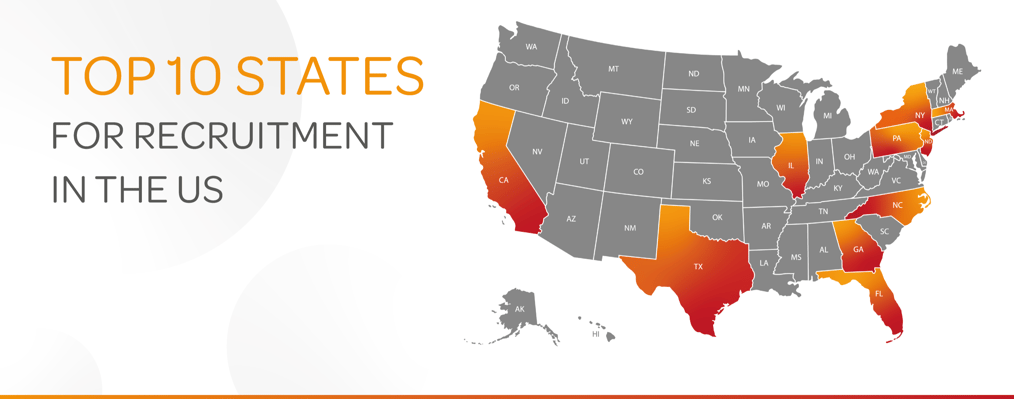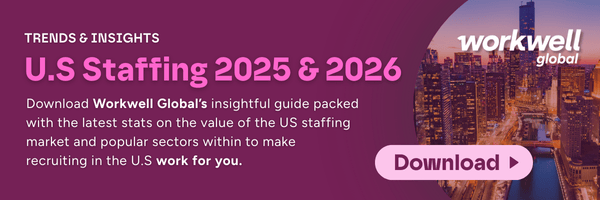If you’re a UK-based recruitment firm thinking of expanding to (or already dabbling in) the US recruitment market, you’ll know the country is full of potential due to its strong and growing recruitment industry. We’ve already detailed the reasons why now is a great time to consider branching out to the US, as well as the pitfalls to avoid when getting started.
The US is the largest recruitment market in the world, with 34% of global market share. But being a geographically huge and economically diverse country, not all states and sectors are equal when it comes to recruitment. In order to get a good foothold, it makes sense to target the high-value, high-demand industries and states strategically.
In this article, we'll guide you through the states and sectors that are worth focusing on, offering insights and our own tips to ensure you can stay competitive and relevant when offering your services in the US.
Skip to Top States
Skip to Top Sectors

Best US states for UK recruiters to Target in 2025
For UK-based recruiters expanding into the US, success lies in grasping the different characteristics of each state. The lucrative US recruitment market offers abundant opportunities but comes with challenges, including understanding state-specific nuances in economy, industries, legislation, taxes, and culture.

Recognising the unique attributes of each state is crucial for tailoring recruitment strategies to meet specific needs and expectations. We won’t be focusing on all of them here, but we can give you a quick glimpse into the benefits and potential drawbacks of the top ten states.
1. California
|
Pros
|
Cons
|
- Diverse industries: California is home to a wide range of industries (thanks to it's high venture capital investment levels) including technology, entertainment, healthcare, and more, providing recruiters with diverse opportunities.
- Talent pool: in addition to its own higher education commitments, the state also attracts a large and highly skilled workforce, particularly in fields like technology and innovation, making it easier to find qualified candidates.
- Innovation hubs: California hosts renowned innovation hubs such as Silicon Valley, fostering a constant demand for top talent and offering recruiters exposure to cutting-edge industries.
|
- High costs: the state's high cost of living can be a challenge, affecting salary expectations and potentially making it more difficult to attract talent. For recruiters the costs of doing business can be higher too.
- Intense competition: given its economic prominence, California experiences fierce competition for skilled professionals, requiring recruiters to be strategic and proactive.
- Traffic and Commuting: major metropolitan areas like Los Angeles and San Francisco face traffic congestion and long commutes, influencing job location considerations and affecting candidate decisions.
|
2. Texas
|
Pros
|
Cons
|
- Job growth: Texas consistently experiences job growth across various industries, providing recruiters with a robust and expanding market for talent acquisition. Many Fortune 500 companies are headquartered in Texas.
- Business-friendly environment: the state's business-friendly policies and low taxes attract companies, fostering a favourable environment for recruiters to connect talent with opportunities.
- Cost of living: Texas has a relatively lower cost of living compared to some other states, making it an attractive destination for both businesses and potential hires.
|
- Weather challenges: some parts of Texas face extreme weather conditions, such as heat waves or occasional hurricanes, which may influence candidate preferences and relocations.
- Diversity in regulations: Texas has varied employment regulations, and understanding the nuances across different cities and industries can be a challenge for recruiters.
- Competition in certain sectors: while Texas offers abundant opportunities, certain sectors, especially in major cities like Austin and Dallas, can be highly competitive, requiring recruiters to navigate talent acquisition strategically.
|
3. New York
|
Pros
|
Cons
|
- The Big Apple: New York, particularly New York City, is a global business hub with a concentration of industries like finance, media, and technology, providing recruiters with access to a diverse range of opportunities.
- Huge talent pool: the state attracts a highly skilled and diverse workforce, making it easier for recruiters to find qualified candidates across various sectors.
- Networking opportunities: New York offers extensive networking opportunities, with numerous events, conferences, and industry gatherings, allowing recruiters to build strong professional connections.
|
- High cost of living: the cost of living in New York, especially in the city, is relatively high, impacting salary expectations and potentially posing challenges in attracting talent.
- Competitive environment: given its economic significance, New York experiences intense competition for top talent, requiring recruiters to employ strategic and proactive approaches.
- Traffic and commuting: New York City, in particular, faces issues with traffic congestion and long commutes, influencing job location considerations and potentially affecting candidate decisions.
|
4. Florida
|
Pros
|
Cons
|
- Job growth: Florida experiences consistent job growth, particularly in industries like tourism, healthcare, and technology, providing recruiters with ample opportunities in a flourishing market. Venture Captial funding in the state is also on the up.
- Business-friendly environment: the state's business-friendly policies, including no state income tax, attract companies, creating a favourable environment for recruiters to connect talent with job openings.
|
- Weather challenges: Florida faces occasional weather challenges, including hurricanes, which can influence candidate perceptions and decisions about relocating to the state.
- Varied talent pool quality: while there is a large workforce, the quality of talent can vary across different industries, requiring recruiters to carefully assess and match candidates with specific job requirements.
|
5. New Jersey
|
Pros
|
Cons
|
- A strategic location: many companies opt to base their operations in this state as it is cheaper than but still close enough to the economic hubs of New York City and Philadelphia. The state also has incentives in place to help businesses grow.
- A diverse economy: the state's economy spans pharmaceuticals, finance, and technology, offering recruiters abundant opportunities to connect talent with thriving industries.
|
- Property taxes: New Jersey has some of the highest property taxes in the nation, which can impact the overall affordability of living in the state.
|
6. North Carolina
|
Pros
|
Cons
|
- A strong economy: that includes tech, life sciences, finance, and manufacturing. Cities like Raleigh and Charlotte are focused on research and innovation, driving demand for skilled professionals.
- A good place to live: the state's good quality of life, business-friendly environment (reforming it's tax laws gradually), and educational institutions make it a compelling destination for recruiters connecting talent with diverse industries.
|
- Education funding challenges: North Carolina has faced challenges in education funding, impacting resources for schools and potentially affecting the quality of education in certain areas.
|
7. Massachusetts
|
Pros
|
Cons
|
- A life science hub: Massachusetts’ innovation-driven economy is underpinned by Boston's concentration of biotech industries. The presence of renowned universities also contributes to a highly skilled STEM workforce.
|
- Cost of living: Boston has a relatively high cost of living, impacting housing affordability for residents.
|
8. Georgia
|
Pros
|
Cons
|
- A growing economy: the state’s business-friendly environment, logistics infrastructure, and a burgeoning film industry create a demand for skilled professionals.
- Friendly employment laws: contractor placement is well used in this state with low unionisation and at-will employment allowing short-term projects and quick hiring.
|
- Traffic and urban sprawl: major cities in Georgia, including Atlanta, experience severe traffic congestion and urban sprawl, which can lead to longer commutes and impact the overall quality of life for residents.
|
9. Illinois
|
Pros
|
Cons
|
- Economic diversity: Illinois boasts a wide-ranging economy, with strengths in finance, technology, healthcare, and manufacturing, providing recruiters with a range of industries to explore and match talent.
- Low cost of living: Overall, living in Illinois is relatively affordable, and gets more affordable the further away you live outside Chicago.
|
- High taxes: Illinois has one of the highest property tax rates in the country, and a high overall income tax burden.
|
10. Pennsylvania
|
Pros
|
Cons
|
- Diverse opportunities: major cities like Philadelphia and Pittsburgh provide a range of job opportunities in healthcare, education, and manufacturing.
|
- Ageing infrastructure: Pennsylvania faces challenges related to ageing infrastructure, which can result in issues such as traffic congestion and the need for ongoing maintenance.
|

High-demand US industries for UK recruitment agencies
Aside from the high-value geographical states, recruiters should also sharpen their focus to make the most of the high-value industries and occupations in the US. Specialising in up-and-coming and well-established sectors will allow UK-based recruiters to tap into dynamic US markets with consistent demand to ensure their long-term growth and profitability. Here is a selection of eight sectors we predict will have large demand in the coming months and years.
1. Computer science and IT
The continued digital transformation across industries increases demand for IT professionals with US tech spending projected to grow by 6.1% in 2025. The evolution of technologies like cloud computing and cybersecurity, along with its continually evolving security challenges, ensures sustained demand for skilled individuals, making this sector high value for recruitment.
The size of the US tech recruitment sector is truly mind-blowing; it is almost the same value as the entire UK recruitment market. Following another year of strong growth, the US tech and IT sector experienced an average salary rise of 1.2% in 2024.
2. Energy and renewables
As the world focuses on sustainable practices, the energy and renewables sector sees substantial growth. The transition to clean energy requires diverse skill sets, making it a lucrative industry for recruiters to connect talent with evolving opportunities and it shows no signs of slowing.
The US government has pledged to make the power sector carbon-free by 2035 and transform the country into a net-zero emissions economy by 2050. They have promised to create 10 million clean-energy jobs, so high-value opportunities for recruitment agencies in the sector are abundant.
3. Life sciences and biotechnology
Advancements in healthcare, pharmaceuticals, and biotechnology drive demand for specialised talent. The industry's innovation and response to global health challenges make it a high-value sector for recruitment, especially considering the need for diverse skill sets.
Although the labour market remains selective whilst it waits for investment flows more freely, salaries still grew by around 2% on average in 2024. According to Staffing Industry Analysts (SIA), the US life sciences temporary staffing segment is projected to grow by 6% in 2025, reaching an estimated market size of $3.71 billion.
4. Artificial Intelligence and Machine Learning
AI and machine learning are integral to various sectors, adoption is rife, creating a demand for skilled engineers and data scientists. AI and machine learning jobs are continuing to surge. Statista reports the global AI market was values at $184.04 billion in 2024 and is expected to rise to 826 billion by 2030, with the US having the largest Machine Learning market in 2024 with a $21 billion value.
This makes senior machine learning engineers, particularly in specialised or leadership positions eligible for substantial annual compensation ranging from $170,000 to $300,000+.
5. Marketing, advertising, and creative
Evolving consumer behaviours and digital platforms necessitate skilled professionals in marketing and creative fields. The dynamic nature of these industries, coupled with the need for innovative approaches, positions them as high-value sectors in recruitment.
Digital advertising expenditures in the United States are projected to increase by 50% between 2024 and 2028, growing from $303 billion to $452 billion.
6. Healthcare
The healthcare industry is consistently essential, with an ageing population and global health challenges. The demand for diverse healthcare professionals, from doctors to technicians, presents continuous opportunities for recruiters.
The healthcare sector is poised for rapid growth - it's expected to grow to $21.59 billion in 2025, with a compound annual gowth rate (CAGR) of 5.71% through to 2034.
7. Finance and fintech
Finance, coupled with the rise of fintech, demands professionals with expertise in digital finance, blockchain, and analytics. The financial sector's constant innovation and adaptation to technology trends make it a high-value industry for recruitment. The employment of financial analysts, especially within technology organisations, is expected to grow 8 percent in the coming decade.
8. Construction
Infrastructure development and urbanisation drive the demand for skilled workers in construction. The industry's cyclical nature and ongoing projects position it as a high-value sector for recruitment, requiring various roles from project managers to skilled labour. In 2024 the sector increased jobs by 2.4 % with non-residential contractors employment increasing by 3% versus 1.5% in residential.
With a construction spending surge now in full swing, a demand for additional construction workers is predicted and as wages rose 4.2% in 2024 it's expected to continue.

Last updated: 22/4/2025



